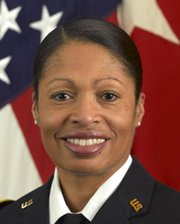Major General Marcia Anderson of the Army Reserve at Fort Belvoir is the Army’s highest-ranking African-American female. She spends much of her time mentoring others, and is continuing Martin Luther King, Jr.’s legacy by promoting inclusion and diversity in the Army Reserve.
Q: Why did you decide to join the Army Reserve?
A: I was in college and needed a science credit, so I originally joined the reserve officer training program at my college for scholarship support, but also because I needed a science credit. After that, I realized pretty quickly it was more about leadership. At the time I was kind of a shy person, so it brought me out in a lot of other ways as well.
Q: Growing up, who was your role model, and where did your work ethic come from?
A: Both my parents, and my grandparents. My dad served in the Korea War, and was in the Air Force at the time, which didn’t have a lot of opportunities for African-Americans at the time, but he persevered. My mom was a very strong person in my family, and although she had to defer her dreams of going to college, she always made it very clear that her expectations for me and my brother were for us to excel. It was very clear they had high hopes and expectations for us.
Q: Your mother helped to integrate Catholic schools in St. Louis, Mo. What did you learn from that experience?
A: My mom was one of the first African-American young women to integrate the Catholic high schools in St. Louis. It just so happens that she was a freshman or a sophomore and a person who ended up being one of my teachers in eighth grade had been a senior when my mother was at the school. She remembered her and told me things about my mom that I didn’t know, including the fact that my mom played on the intramural basketball team. You never think about your parents being athletic. She was a pretty outgoing person. Beyond her telling me the story that she helped integrate the schools, the teacher kind of rounded her out for me as a person and that she had contributed to the community in a lot of ways.
Q: Was it challenging serving in the Army Reserves as an African-American woman?
A: It was more me putting hard requirements on myself. I really didn’t feel from Day One that anyone was setting barriers for me. For example, there was this opportunity to go to Parachute Training School, and I thought, that’s a challenge that I want to set for myself. It didn’t even occur to me that there weren’t a lot of women until I got there. Then it was simply more about me overcoming my own fears about heights and some of the training I had to. Truly, it didn’t feel that anybody was setting up barriers.
Q: Did you feel overwhelmed when you became the highest-ranking African-American female Army officer?
A: When I was notified that I would be promoted, it was a shock to me because I never thought I would ever reach that particular level. As I thought about it, I saw myself as kind of continuing the legacy of people like the Montford Marines, the Tuskegee Airmen, the African American women who served as nurses during World War II and have almost been forgotten by history. I was simply carrying on their legacy, and it was humbling. It also filled me with a lot of pride that we were one step closer to continuing to demonstrate that not only can we do this job, we can do it well, and in some cases better than a lot of other people. I also wanted to make sure I used this time that’s been given to me to try to inspire and mentor as many people as I possibly can. I spend a lot of time trying to work with young officers and sergeants and encourage them to reach for the stars.
Q: How has Martin Luther King, Jr.’s legacy inspired you in your role today?
A: I am 56 years old, so I actually remember a lot about Dr. King and the things that he did. I remember the day we got the news that he was assassinated. That is just one of those moments in history that just stays with you. I still feel that it is incumbent on me to try to realize his dream in ways that maybe he even hadn’t envisioned. His vision at the time was focused on segregation. As we move forward now, we are looking at diversity and inclusion. In the Army Reserve, there are over 200,000 citizen soldiers. Over 22 percent of those in the Army Reserve are African-American. I’m sure Dr. King never thought about that when he was marching and trying to work towards the Civil Rights Act and Voting Rights Act, so I think it is incumbent on me, and all of us, to try to take his vision even further, talking about inclusion. I think we’ve truly arrived when we include people all across the spectrum, multi-cultural, multi-gender, and make sure all of those perspectives help us make our organization more successful.
